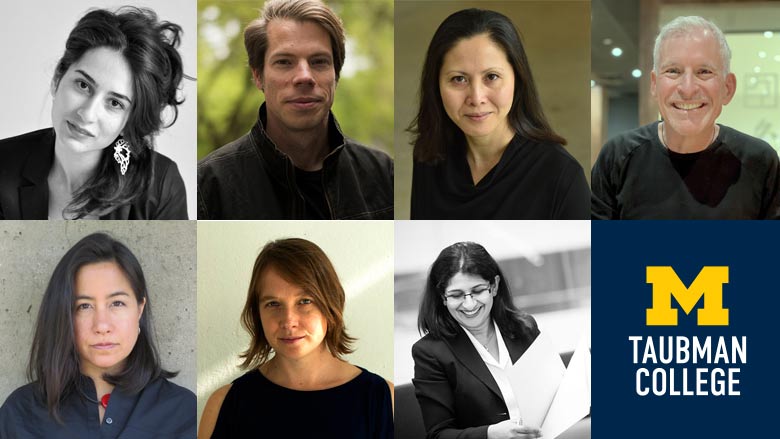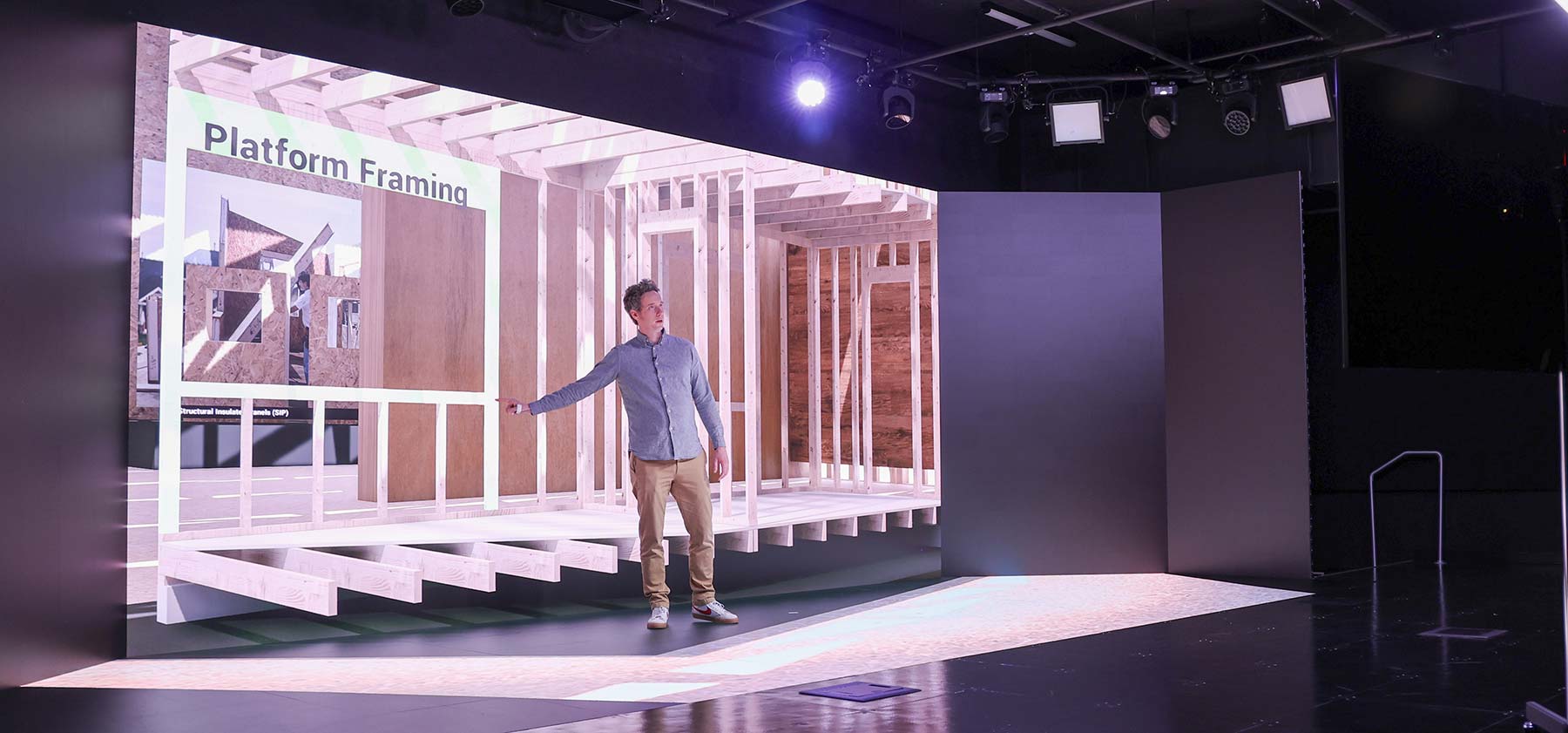Taubman College faculty were awarded Research Catalyst and Innovation (RCI) Awards intended to enhance and support research development and collaboration across U-M and provide support for small and preliminary projects, publication subvention, and artistic production and performances. Proposals are reviewed by the Taubman College Research Policy Committee and evaluated based on their research and creative merit, disciplinary significance and broader constituencies, faculty developmental stage, and their research development strategy.
The funded projects at Taubman College include:
Robotic 3D Printing of Carbon Fiber Reinforced Plastic
RCI Award for Small Scale and Preliminary Projects
Given the rapid urbanization, ever-increasing material consumption, and the environmental impact of shipping raw and processed materials around the planet, construction speed and structural weight reduction are more critical than ever. This research aims to develop large-scale robotic 3D printing of Carbon Fiber Reinforced Plastic (CFRP) to enable fast, sustainable, and affordable manufacturing of ultra-lightweight Micro Houses. A 1:1 scale prototype of an entire section of a 400 square-ft Micro-house will be manufactured to verify the system’s suitability for actual construction. The research outcomes will be used as preliminary findings to seek external funds. The grant will also help with team-building and reaching out to stakeholders in the Detroit area.
Project team: Mania Aghaei Meibodi (PI) with U-M Taubman College
Functionally Graded Construction: Performance Through Continuous Material Variation
RCI Award for Small Scale and Preliminary Projects
This project explores the emerging potential of functionally graded additive manufacturing (FGAM) to produce high-performance, materially efficient building components. FGAM builds on the geometric freedom provided by typical 3D printing processes by adding the capability to locally tailor material composition across a continuous component. In close collaboration with the U-M Civil & Environmental Engineering Department, the team will aim to harness FGAM approaches to increase the efficiency and performance of building components while reducing the overall carbon footprint of construction.
Project team: Wes McGee (PI), Tsz Yan Ng (Co-PI) with U-M Taubman College
The Unsettlement Project: Locating Settler Colonialism at the University of Michigan
RCI Award for Small Scale and Preliminary Projects
The “land gift” for an educational institution made by Ojibwe, Odawa, and Potawatomi tribes in the 1817 Treaty of Fort Meigs is noted in most origin stories of the University of Michigan. At the same time, U-M’s complex relationship to settler colonialism – manifested in its landscapes, buildings, disciplines, collections, histories, and communities of students, staff, and faculty – has been barely registered, with most registrations in response to policy mandates or student activism. This project will create a research infrastructure to study the most pressing and salient dimensions of the university’s settler-colonial legacy.
Project team: Andrew Herscher (PI) with U-M Taubman College; Ana María León (Co-PI) with U-M Taubman College, and College of Literature, Science, and the Arts
Light Forms
RCI Award for Artistic Productions and Performances
The quality and quantity of natural light and darkness transmission in our built world are essential to the performance of our spaces and the wellbeing of their occupants. Unfortunately, we have become an indoor species, out of step with the natural cycles of day and night, and heavily reliant on artificial illumination. This project proposes a modular architectural system made of glass units through experimentation in concert with both analog and digital design processes, eventually leading to a production run of glass forms with a regional glass manufacturer. These forms will be assembled at the U-M Biological Station, in a location that is not subjected to artificial light. The design will investigate the combination of glass production expertise, geometric tesselation, structural implications, and the resulting effects of light, in support of harvesting natural light rhythms within architecturally constructed spaces to realign the connection between our built environment and the occupant.
Project team: Catie Newell (PI), Upali Nanda (Co-PI) with U-M Taubman College; Alli Hoag with Bowling Green State University
In Spring of 2021, three other projects received awards in the first round of the Research Catalyst and Innovation Award program:
Art Exhibition Design and Development for Critical Algorithm Research
RCI Award for Artistic Productions and Performances
The funding supported exhibition design and prototyping for three solo gallery exhibitions, finding opportunities for creative research exhibitions, and the provision of installation budgets. The objective was to establish a public research profile at the intersection of critical algorithm studies and critical design, by approaching a higher caliber of public gallery and a larger scale of exhibition. The research sought to bring this investigation into architecture by connecting algorithmic visualization with site-specific spatial design principles, staking out a territory for research practice, framed around ‘installation-scale critical algorithm design projects’ that connects spatial design to critical algorithm studies.
Project team: Catherine Griffiths (PI) with U-M Taubman College, and College of Literature, Science, and the Arts
Collaborative Construction: Robotic Construction and Mixed Reality-Assisted Human Intervention
RCI Award for Small Scale and Preliminary Projects
The project proposed the integration of mixed reality (MR) and robotic assembly to facilitate a human-robot collaborative construction process. The project focused on timber framing as the main case-study for construction system. Seamlessly transferring digital design data to automated timber assembly procedures enables the realization of nonstandard structures, opening up opportunities for both performance and expression in timber architecture. Yet, these projects also observed the necessity for human interventions for the successful implementation of robotic assembly processes. In particular, human interventions proved effective for handling material and fabrication tolerances and for performing complex tasks that might not be feasible to automate, such as inserting screws to join timber elements. However, such interventions pose several challenges and require further investigation. One key challenge is the visualization of spatial information to guide human interventions while enabling orchestrated coordination between the robotic processes and manual tasks. MR technologies are effective in augmenting spatial information to support the fabrication of nonstandard structures, and this research focuses on MR’s capabilities as an effective tool to assist human interventions during robotic assembly by developing methods and an interconnected workflow for assembling full-scale timber frame wall systems.
Project team: Arash Adel (PI) with U-M Taubman College
A 3D model database for Architecture design using Graph Convolutional Neural Networks and 3D Generative Adversarial Networks
RCI Award for Small Scale and Preliminary Projects
This proposal’s goal was the creation of an architecture-specific 3D model database in order to expand and improve the results of this highly innovative design method. At the time of the proposal review, there were no 3D Model databases for architecture that cater specifically to AI research. The proposed database consisted of up to ten thousand architecture models representing housing projects of different scales and, more importantly, from different cultures. This was crucial in order to avoid the creation of an architecture database that is culturally biased in one specific direction. This allows users to interrogate architecture through the use of AI techniques in an inclusive fashion, ensuring a diverse approach to this new branch of architecture. The proposal was part of the newly founded AR2IL laboratory, an interdisciplinary laboratory between U-M Architecture, Robotics, and Computer Science departments.
Project team: Matias del Campo (PI) with U-M Taubman College





